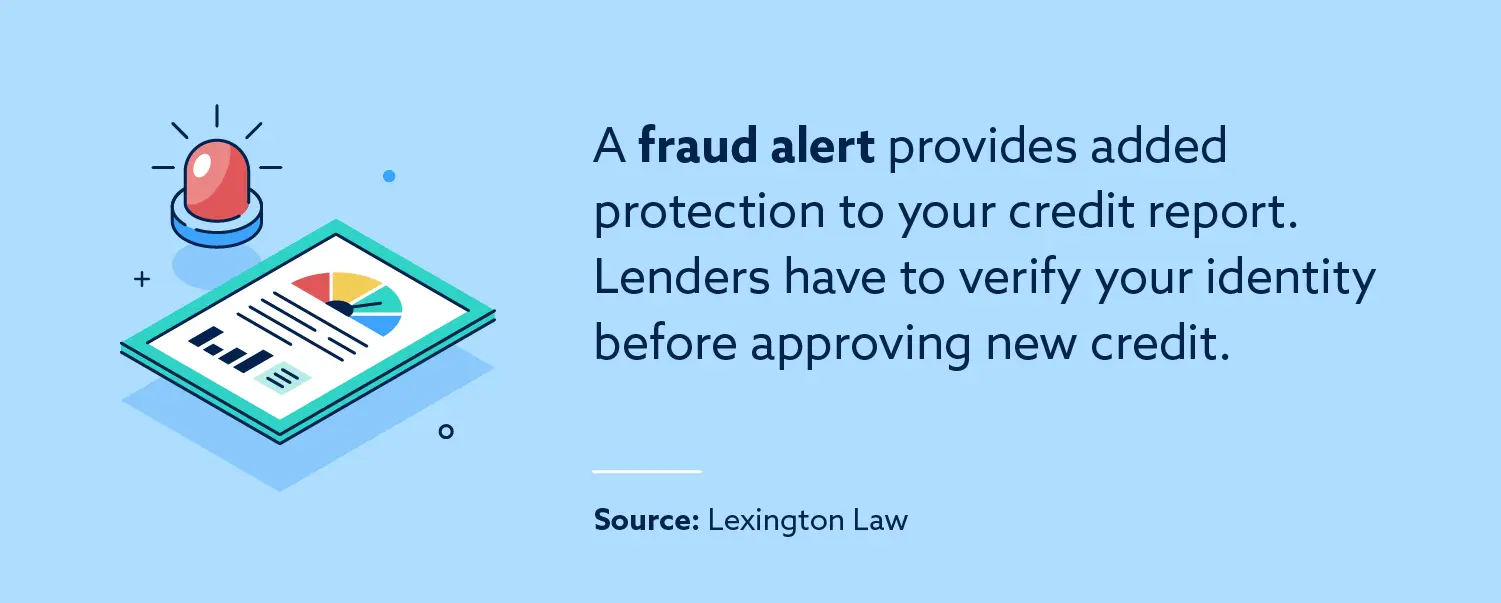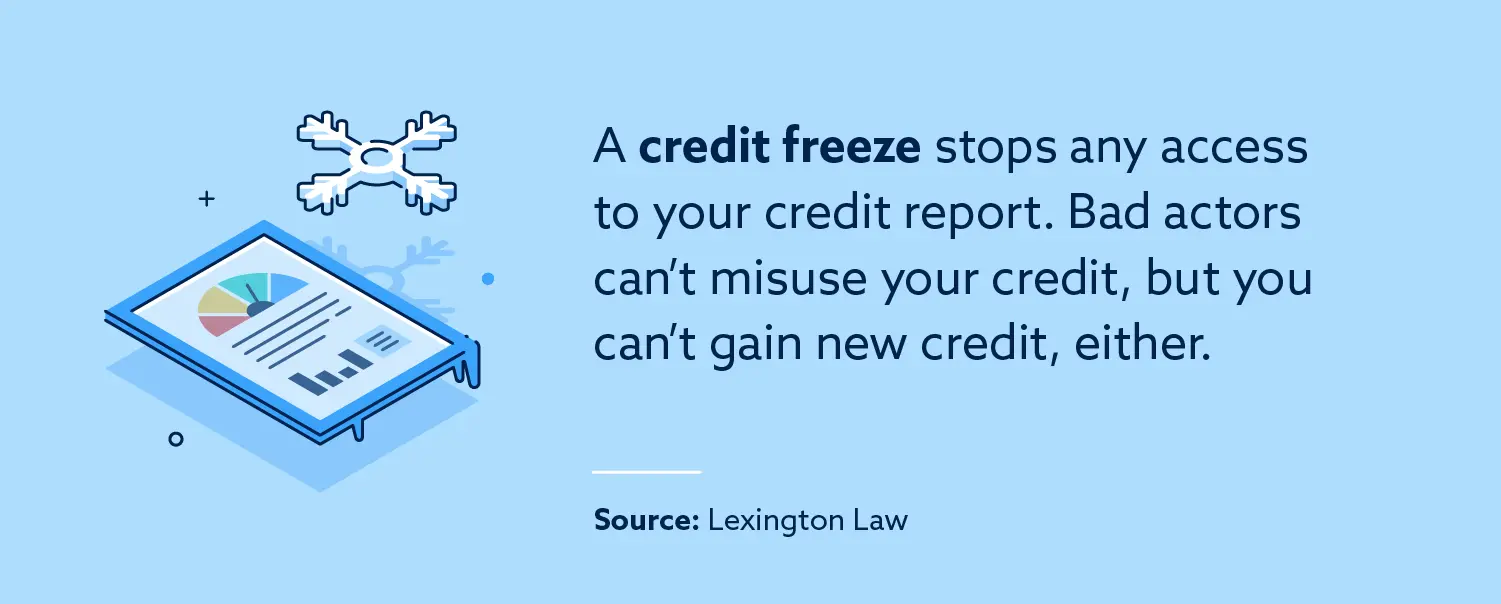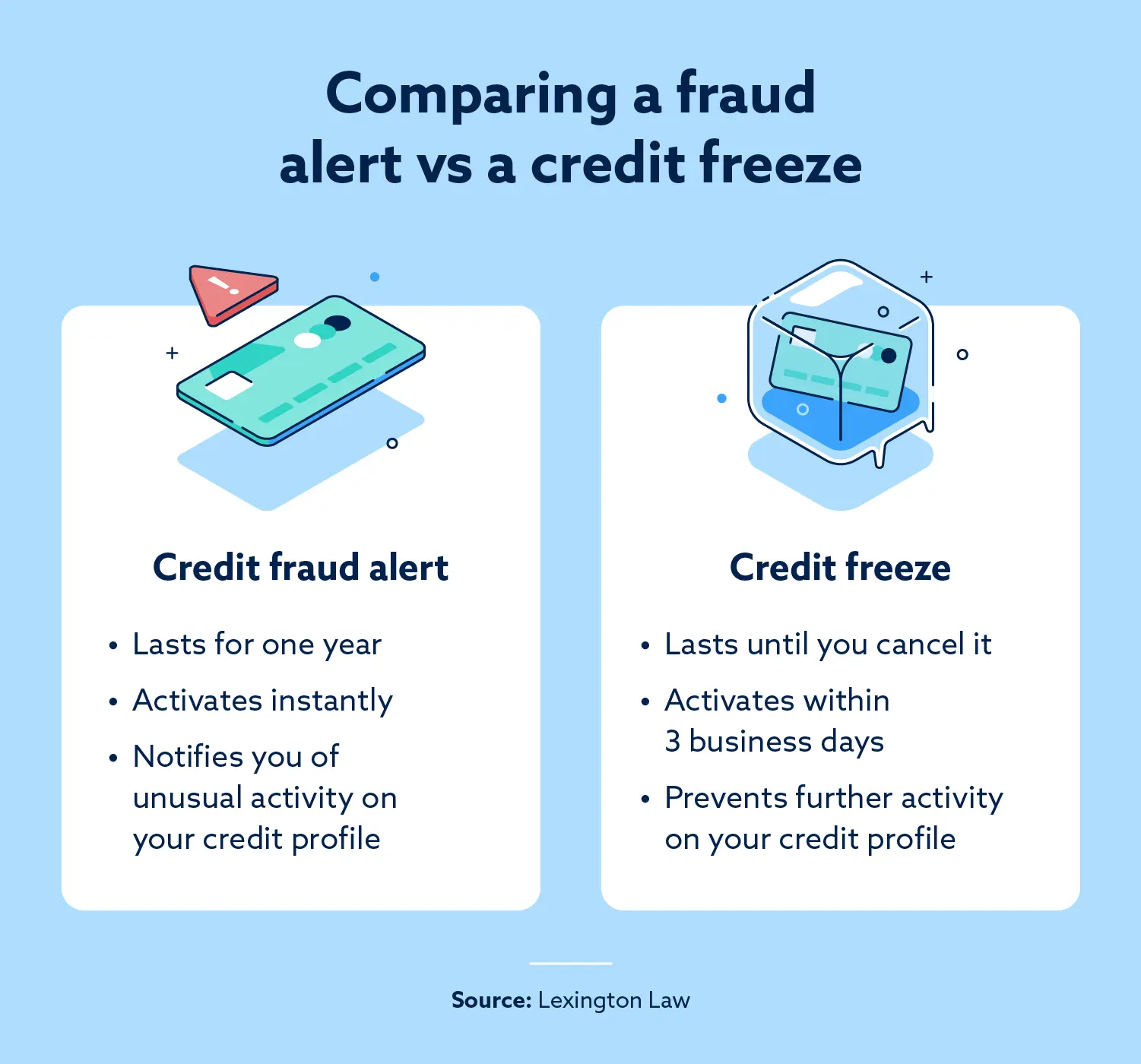
A fraud alert requires creditors to take extra steps to verify your identity and will stay active for one year or until cancellation. A credit freeze prevents any new activity on your credit report, both positively and negatively, until you manually remove it.
The information provided on this website does not, and is not intended to, act as legal, financial or credit advice. See Lexington Law’s editorial disclosure for more information.
Identity theft is a widespread crime that resulted in over 400,000 reports to the Federal Trade Commission (FTC) in 2023 alone. A fraud alert and credit freeze are two tools that consumers can use to combat identity theft attempts. If you’re unfamiliar with these tools, you may wonder about the difference between a freeze and an alert.
Simply put, a fraud alert will prompt creditors to verify your identity before issuing new credit while a credit freeze will prevent any new activity on your credit report altogether.
Below, we’ll explore the difference between a fraud alert and a credit freeze. Understanding these tools will give you more resources to protect your credit. We’ll also explain how these tools can potentially affect your credit score.
What is a fraud alert?
You can place a fraud alert on your credit report to require lenders to verify your identity before issuing new credit. If you, or a cybercriminal who’s stolen your personal information, tries to open new credit in your name, lenders will see the fraud alert you’ve placed and confirm your identity before proceeding.

Fraud alerts are free tools that people can use if they’ve experienced identity fraud or suspect their personal information was stolen.
Fraud alerts come in different categories, which include:
- Standard fraud alert: A standard fraud alert typically lasts one year but can be renewed as many times as needed. Individuals don’t need to be victims of identity theft to activate this kind of fraud alert on their accounts.
- Extended fraud alert: Extended fraud alerts can last up to seven years. This option is also called a “victim-fraud statement” as it’s only available to people who’ve experienced identity theft. To qualify, you have to file a report with the police or the FTC’s IdentityTheft.gov website. Extended alerts will require additional verification and let you opt out of marketing lists.
- Active-duty fraud alert: When military service members go on active duty assignments, they can apply for this alert to protect their accounts while they’re abroad. The alert typically lasts one year but can be renewed as long as the individual is deployed. They’ll also be removed from marketing lists for two years unless they request otherwise.
How do you place a fraud alert?
You can place a fraud alert on your account by contacting one of the three major credit bureaus—Experian®, Equifax®, or TransUnion®. After you notify one bureau, it’s their responsibility to inform the others. You can set up a fraud alert online or contact any of the bureaus by phone with this request.
Here are the national phone numbers for each major bureau:
- Equifax phone number: 1-888-378-4329
- Experian phone number: 1-888 397-3742
- TransUnion phone number: 888-909-8872
To successfully set up an alert, you’ll need to share proof of identity items like your driver’s license and Social Security number.
How do you remove a fraud alert?
Fraud alerts are automatically lifted from your account once you reach their deadline. You can also contact each credit bureau separately and request that the fraud alert be lifted early. Have your proof of identity handy before you contact each bureau.
What is a credit freeze?
A credit freeze stops all access to your credit report. This prevents anyone, including yourself, from opening a new account under your name. You’ll have to “thaw” or “unfreeze” your account to permit new activity.

How do you freeze your credit?
To freeze your credit, you’ll have to contact each of the three major credit bureaus separately. Note that fees are usually associated with a credit freeze, with the exact amount varying by state. On average, expect to pay around $10 per bureau for a credit freeze. You can apply for a credit freeze online or via phone for all three bureaus.
When you’re setting up a credit freeze, you’ll be asked to set up a PIN or password, which can later be used to unfreeze your account.
How do you unfreeze your credit?
Your report will stay frozen until you thaw or unfreeze your credit. To unfreeze your account, you’ll need to contact each of the credit bureaus and provide your PIN. There may be a small fee associated with unfreezing your account with each agency.
Once you put in a request to unfreeze your account, the change can take from as little as a few minutes to up to three days. As a result, it’s essential to give yourself plenty of time for the account to thaw before applying for more credit.
If you lose your PIN, unfreezing your account will still be possible, but it’ll take longer to approve.
Do fraud alerts or credit freezes affect your credit?
No, fraud alerts and credit freezes don’t affect your credit. In fact, they can protect your credit from identity fraud attempts. Identity fraud is a serious situation that can significantly drag your credit score down and take months to years to clear up on your credit report.

Which option is right for you?
While you can set up both a fraud alert and a credit freeze, that likely won’t be necessary. Your personal circumstances will determine whether a fraud alert or credit freeze is necessary. Common scenarios where you might consider either option include:
- Seeking new loans: If you’re looking for a mortgage or an auto loan, you won’t want to freeze your credit. Consider setting up a fraud alert instead.
- Identity theft: You’ve recently experienced identity theft or had your information stolen. Consider a credit freeze until your identity theft concerns are resolved.
- Retirement: If you’ve reached a point where you don’t need to apply for too much more new credit, consider freezing your account for a long period.
Even with a credit freeze or a fraud alert on your account, it’s still crucial for you to check for fraudulent charges on your cards and look for red flags on your credit reports. You never know when something could slip through, and if it does, it’s crucial to act quickly. The longer something remains on your credit report, the longer it will impact your credit and be harder to rectify.
Protect your credit with Lexington Law Firm
A sound strategy is to regularly set up fraud alerts on your bank accounts and escalate to a credit freeze in dire scenarios. However, it’s still possible to experience identity theft in spite of this prudence. Lexington Law Firm’s focus tracks are helpful resources for repairing your credit after major life events.
Learn more about our services to see which credit repair resources are right for you.
Note: Articles have only been reviewed by the indicated attorney, not written by them. The information provided on this website does not, and is not intended to, act as legal, financial or credit advice; instead, it is for general informational purposes only. Use of, and access to, this website or any of the links or resources contained within the site do not create an attorney-client or fiduciary relationship between the reader, user, or browser and website owner, authors, reviewers, contributors, contributing firms, or their respective agents or employers.
